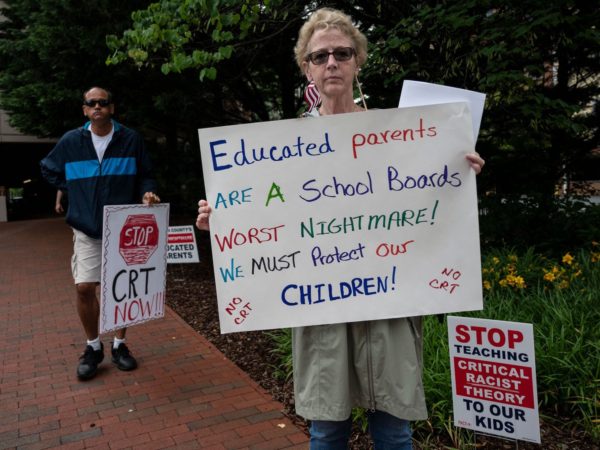

13, 2021 By Jordan Davidson
State school boards associations are condemning the National School Boards Association (NSBA) for mischaracterizing protests in their districts and using them to justify the involvement of federal law enforcement and domestic terrorism laws against concerned parents.
Just last month, the NSBA sent a letter to President Joe Biden begging him and his administration to prosecute and punish parents who were fed up with the radical indoctrination of their children in schools.
Shortly after, the U.S. Justice Department’s Attorney General Merrick Garland directed the FBI and state attorneys to address “a disturbing spike in harassment, intimidation, and threats of violence against school administrators, board members, teachers, and staff who participate in the vital work of running our nation’s public schools.”
As of Wednesday, at least 14 state school board associations reported to Parents Defending Education that they were not consulted before the letter was sent to the Biden administration.
Particular organizations such as the Georgia School Boards Association said the NSBA even cited incidents in their state as justification for federal overreach without asking them for input first.
“The Georgia School Boards Association (GSBA) was not consulted about this letter, did not provide information to NSBA, and was not informed that the letter was being sent, even though a Georgia school district was used as an example in the letter,” GSBA noted in its statement to Parents Defending Education. “GSBA supports the constitutional authority of local boards to manage and control the public schools of this state.
Elected officials and appointed leadership who are closest to the community are best suited to make those decisions, especially the hard ones. … While we look for support to our state and federal governments, we do not seek the involvement of federal law enforcement or other officials in local decisions.”
While a handful of the state associations simply said they were unaware of NSBA’s letter until it was published, most state groups condemned the national association’s request to use domestic terrorism laws to target parents and said the protests they’ve experienced have not warranted law enforcement involvement beyond the local and state level.
“The DSBA disagrees, in the strongest possible terms, with parents and citizens protesting school board meetings being characterized as ‘domestic terrorists’ and their protests being likened to ‘hate crimes,’” the Delaware School Boards Association said in a statement.
“The DSBA firmly asserts that citizen and public engagement in school board meetings is an integral and vital aspect of school board governance.
We also made it clear that any attempt to silence citizens’ voices is a clear violation of their rights to free speech. The DSBA is an apolitical advocacy organization, and we do not engage in partisan politics.”
A few of the associations even said they support parents’ rights to protest and publicly express frustration with how their children are being taught.
“To this end, we provide extensive resources and training to our members, so school boards not only exceed the legal requirements of the Open Meetings Act, but also authentically nurture school communities where parent and community voices are welcomed,” the Texas School Boards Association wrote.
“It’s natural that community members across a state as large and diverse as Texas are going to have different opinions on important K-12 issues. We think this diversity of opinion — and the ability to express it openly — makes us strong.”
The Florida School Boards Association even said that “several elements of your letter run counter to the tenets embraced by the FSBA” and that “this communication has caused serious concerns, conflict, and consternation for many of our members within the FSBA.”
“Not only has it unnecessarily distracted from the important work being carried out by our members, it has strained important local and state collaborative relationships our members have worked hard to build and maintain for years,” the FSBA reported.
“If we are to ever again have a strong national federation, it must be one that eschews rhetoric, avoids partisanship, collaborates with its members, and focuses its energies on intentional impact.
It must reinforce the role families and communities play in public education and underscore the importance of local school boards.
It must spend its energies and efforts focused on issues and events, information, and policies that unite rather than divide. It must prioritize high governance standards and follow them.”
more recommended stories
 Fentanyl Seizures at Border Continue to Spike, Making San Diego a National Epicenter for Fentanyl Trafficking
Fentanyl Seizures at Border Continue to Spike, Making San Diego a National Epicenter for Fentanyl TraffickingFentanyl Seizures at Border Continue to.
 Utah Man Sentenced for Hate Crime Attack of Three Men
Utah Man Sentenced for Hate Crime Attack of Three MenTuesday, August 8, 2023 A.
 Green Energy Company Biden Hosted At White House Files For Bankruptcy
Green Energy Company Biden Hosted At White House Files For BankruptcyAug 7 (Reuters) – Electric-vehicle parts.
 Former ABC News Reporter Who “Debunked” Pizzagate Pleads Guilty of Possessing Child pδrn
Former ABC News Reporter Who “Debunked” Pizzagate Pleads Guilty of Possessing Child pδrnFriday, July 21, 2023 A former.
 Six Harvard Medical School and an Arkansas mortuary Charged With Trafficking In Stolen Human Remains
Six Harvard Medical School and an Arkansas mortuary Charged With Trafficking In Stolen Human RemainsSCRANTON – The United States.
 Over 300 People Facing Federal Charges For Crimes Committed During Nationwide Demonstrations
Over 300 People Facing Federal Charges For Crimes Committed During Nationwide DemonstrationsThe Department of Justice announced that.
